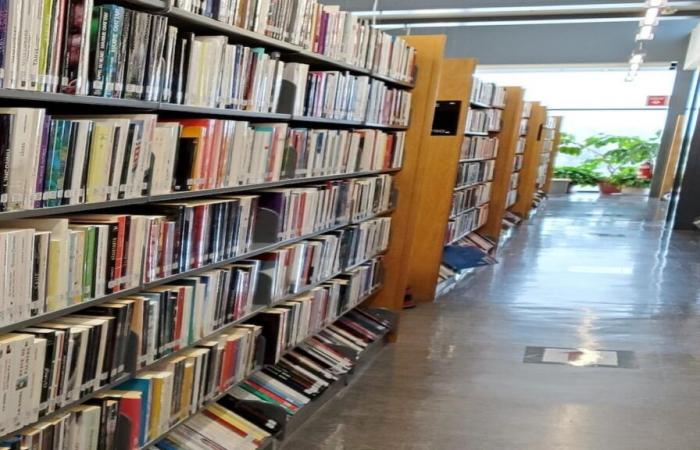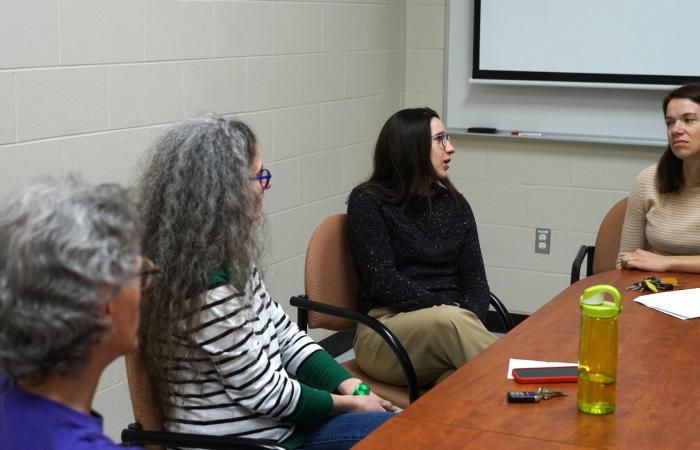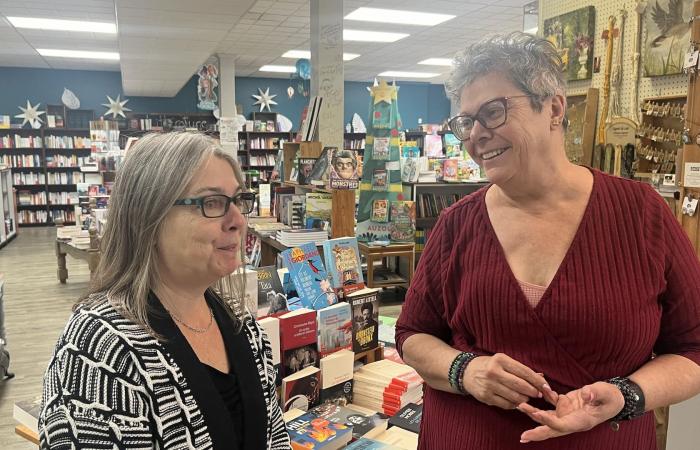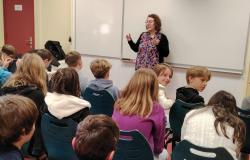In Montreal, the Book Fair is in full swing. Local authors present their latest publications. However, many of these new works which sooner or later ended up in CEGEP libraries will not fill their shelves. In fact, these libraries can no longer buy Books. Students must now make do with discoveries from previous years and the great classics.
In Saint-Hyacinthe, the CEGEP library is the pride of professors in the literature department. Usually, we always have the latest literary prizes, the new releases; students love it
enthuses Daphné Lajoie, who has taught at CEGEP since 1994.
However, when we browse the shelves, we realize that the new products are now absent. We no longer buy any books. All of these are from at least last year
observes the teacher, who praises her librarian colleague who still strives to keep the library alive.
Daphné Lajoie, literature teacher at Cégep de Saint-Hyacinthe. Photo: -/Alexis Gacon
It’s not spectacular, a library that’s wasting away, but it’s sad
she adds.
This unmistakable cultural hub is therefore on a respirator. The book purchasing budget – expected to increase to $31,000 this year given the rise in book prices – fell from nearly $20,000 last year to less than $5,400 this year. And there’s already only $3,000 left in the coffers.
This summer, Quebec CEGEPs received a directive from the Ministry of Higher Education to reduce expenses related to building repairs and the purchase of equipment. CEGEPs, which must deal with a reduced budget, now decide on the expenses they deem priorities to compensate for these budgetary restrictions.
These massive cuts are felt throughout the network
says Marie Montpetit, president and CEO of the Fédération des cégeps, who maintains that the investment budget of certain establishments has been cut in half compared to what had been authorized before the summer by their board of directors.
Marie Montpetit, President and CEO of the Fédération des cégeps. Photo: -/Alexis Gacon
The National Federation of Teachers of Quebec conducted a survey among its members, the results of which show that other CEGEPs can no longer buy books. One mentions a budget reduced to 10% of last year’s for the purchase of books.
Others will prioritize books that develop students’ teaching skills
. Some wanted to renew the aging library furniture, but this is impossible.
It hurts a lot
The professors of the literature department of the Cégep de Saint-Hyacinthe stick together, but there is no discouragement.
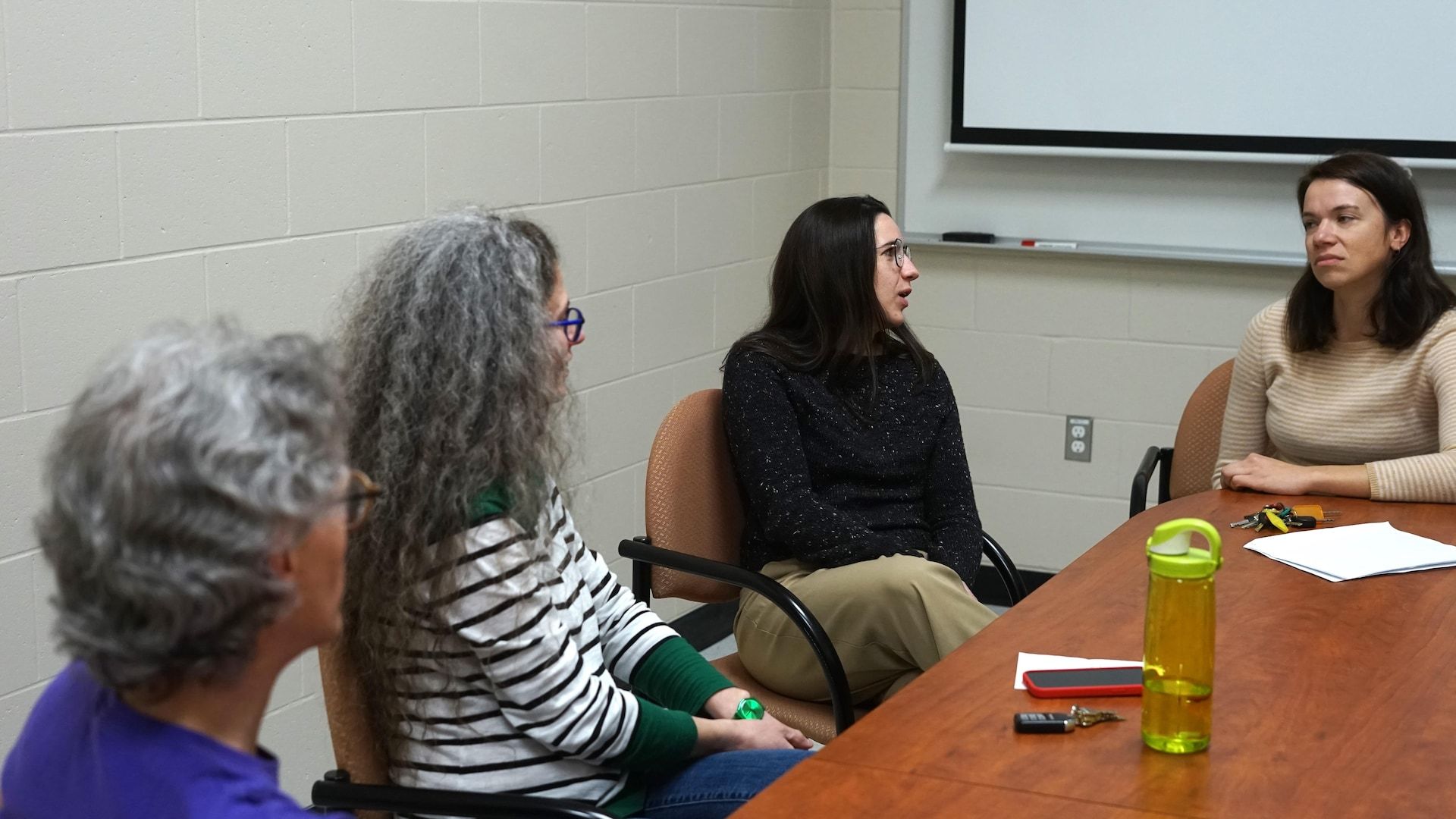
Literature teachers at Cégep de Saint-Hyacinthe. Photo: -/Alexis Gacon
Francis Favreau, a professor at the end of his career, says to himself that by cutting the budget reserved for the library, the CEGEP said that it would seem less, that it would hurt less
. However, for literature teachers, it hurts very much
.
To update the content of his course, he wanted to purchase a documentary, the license of which costs $375 for one year. The Battle of Saint-Léonardit’s the whole linguistic context of the 1960s which leads to Bill 101, it was perfect.
He then made the purchase request to the Cégep, which sent him a series of questions to justify this request. For it to be authorized, the teacher had to be able to explain that the film would be useful to other departments and that its purchase should therefore be prioritized… His battle of Saint-Léonard was a defeat.
We didn’t order it. I told myself that if a colleague wanted to buy comics for his class, he wouldn’t be able to because of my purchase. We said to ourselves that it was impossible to move forward.
Another teacher, Florence Tétreault, indicates that for her students to have access to the works she wants them to study, she must go and get some from a library in Montreal. It makes the task very complicated
she laments.
And the entire book ecosystem is affected by these cuts.
In Saint-Hyacinthe, the L’Intrigue bookstore can attest to this. This fall, the co-owner, Louise Desautels, learned that the Cégep was canceling an order whose cost was between $5000 and $6000
.
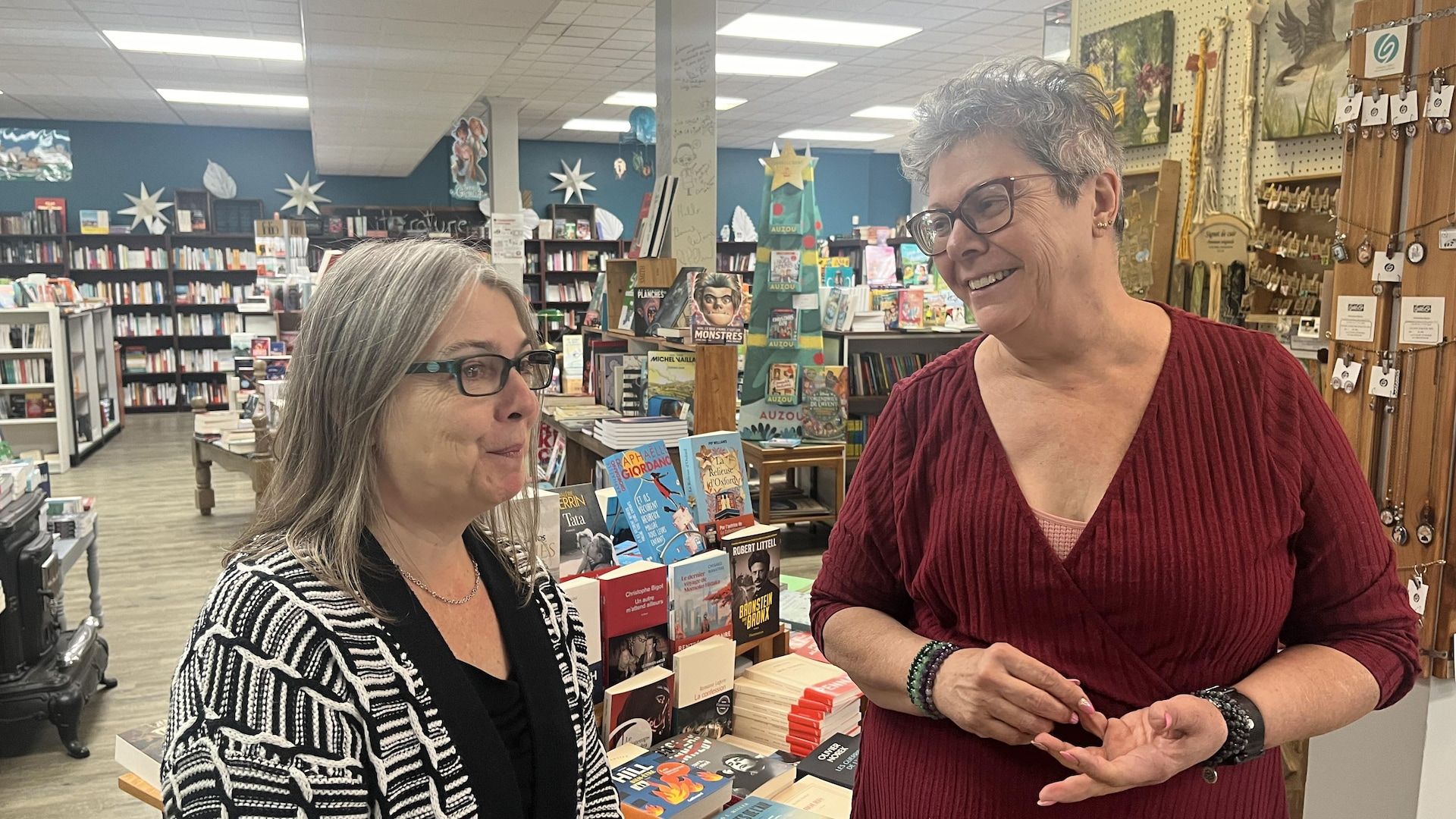
Louise Desautels (right) chats with the other co-owner of the L’Intrigue bookstore, located on avenue de l’Hôtel-Dieu, in Saint-Hyacinthe. Photo: -/Alexis Gacon
We were informed on September 30 that the budget was coming to an end, and that we had to cancel the titles that were on order and had not yet been delivered. [ …] Ultimately, it is all access to literature that is impacted by this situation. […] This is the first time this has happened.
Which work is essential?
The teachers of this CEGEP deplore a undermining student curiosity
who have access to fewer recent works. We create a little fire of love that they have for literature and then extinguish it
laments Professor Virginie Blanchette-Doucet. This situation also creates competition unhealthy
when it comes to deciding which work is essential or not. That’s an absurd question.
said Daphné Lajoie.
Gaël, a CEGEP student, realizes the changes at the library and also feels that these cuts can harm the quality of teaching.
We need to give teachers more resources to explore new things, show us documentaries, new books, to try to pique the curiosity of young people. And if we cut off these resources, we’re shooting ourselves in the foot.
he said.
Cédric, his comrade, adds this: We’re not in the government’s place, but when we see the money it gives to the battery industry… […] From an outside point of view, we can still say that it’s a shame, because health and education are the two most important things in our society.
One example among others
For Marie Montpetit, the freezing of book purchases is one example among others of the consequences of the budgetary restrictions imposed by the government since the start of the school year. She observes significant effects in several programs as the CEGEP student population grows.
Laboratories can no longer purchase equipment for training in health, nursing, natural sciences, respiratory therapy, etc.
she criticizes, although she says she understands that the government is facing budgetary constraints.
Governing is about making choices. And making choices that take us backwards as a society are necessarily bad choices.
For Yves de Repentigny, vice-president responsible for the CEGEP group at the National Federation of Teachers of Quebec, these cuts are not aimed at the right targets.
Books are culture. Culture is the soul of a people. When we cut into the soul of a people, we lead the people to their ruin. So, we have to stop thinking with a cash drawer instead of our heart.
The FNEEQ identifies major difficulties apart from the freeze on the purchase of books in CEGEPs. It’s absurd. Laboratories without equipment that force a college to refuse admissions, a lack of mannequins to study nursing, a refrigeration system that leaks without having the money to repair it…
By email, the Treasury Board, which declined our interview requests, wrote that it is simply asking departments to respect their budgets and that a spending review is underway.
The Ministry of Higher Education, which also declined our interview request, indicates that the MAOB envelope (furniture, equipment, tools and library) has increased for the network, going from 59 million dollars to 67 million this year . He adds that sound management of public finances requires taking necessary measures to enforce budgets.
“The ministry trusts establishments to adequately prioritize the amounts made available to them. […] It is up to establishments to define their priorities between carrying out infrastructure projects and purchasing equipment. »
The management of the Cégep de Saint-Hyacinthe refused our interview request, but the teachers assure that it is in solidarity with them.
If, tomorrow, these cuts meant that we stopped buying books in the first year of primary school, people would go to the barricades. […] But at 18, it’s no longer really important. […] I think it’s important to motivate them to read again so that they see, when they go out on their own, that literature is beautiful, and that they want to come back to it.

